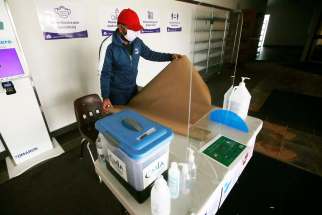Nurses, aides suffer burnout as COVID increases among ranks
Read this article for free:
or
Already have an account? Log in here »
To continue reading, please subscribe:
Monthly Digital Subscription
$0 for the first 4 weeks*
- Enjoy unlimited reading on winnipegfreepress.com
- Read the E-Edition, our digital replica newspaper
- Access News Break, our award-winning app
- Play interactive puzzles
*No charge for 4 weeks then price increases to the regular rate of $19.00 plus GST every four weeks. Offer available to new and qualified returning subscribers only. Cancel any time.
Monthly Digital Subscription
$4.75/week*
- Enjoy unlimited reading on winnipegfreepress.com
- Read the E-Edition, our digital replica newspaper
- Access News Break, our award-winning app
- Play interactive puzzles
*Billed as $19 plus GST every four weeks. Cancel any time.
To continue reading, please subscribe:
Add Free Press access to your Brandon Sun subscription for only an additional
$1 for the first 4 weeks*
*Your next subscription payment will increase by $1.00 and you will be charged $16.99 plus GST for four weeks. After four weeks, your payment will increase to $23.99 plus GST every four weeks.
Read unlimited articles for free today:
or
Already have an account? Log in here »
Hey there, time traveller!
This article was published 29/09/2020 (1895 days ago), so information in it may no longer be current.
Staff members at personal care homes and hospitals, who are exhausted as they work short-handed, are increasingly coming down with COVID-19 as Manitoba rides its second pandemic wave, provincial labour leaders warn.
Cases of COVID-19 in health care workers have been rising over the past seven weeks, data from the provincial government show.
After 11 weeks in the summer with just one case reported in a health care worker, 59 staff members were diagnosed with COVID-19, from Aug. 2 to Sept. 19.
The increased cases began around the same time multiple clusters of cases were discovered in southern Manitoba, connected to communal living and the Brandon-area Maple Leaf Food processing plant, and outbreaks were declared at personal care homes in Brandon and Steinbach following the phase four reopening of the economy on July 25.
“Staffing levels are currently unsustainable in Manitoba. If more cases of COVID keep popping up in nursing homes, it’s going to cause more concern to the staffing levels, and it will become worse,” said Debbie Boissonneault, president of CUPE 204, which represents more than 14,000 health care workers in Manitoba.
Rapid testing for health-care workers not being considered
Rapid COVID-19 testing for people working in health care isn’t currently planned as part of the province’s pandemic response.
In a statement, a spokesperson for Shared Health said rapid COVID-19 testing is being used in Manitoba to test some patients with symptoms of the disease, with a focus on urgent patient care and support for rural and remote communities where transport timelines to the Cadham Provincial Lab may be significant.
Rapid COVID-19 testing for people working in health care isn’t currently planned as part of the province’s pandemic response.
In a statement, a spokesperson for Shared Health said rapid COVID-19 testing is being used in Manitoba to test some patients with symptoms of the disease, with a focus on urgent patient care and support for rural and remote communities where transport timelines to the Cadham Provincial Lab may be significant.
Shared Health is also piloting another type of rapid testing in Winnipeg which can get a result in four hours. Since Sept. 14, it has been used to test patients admitted to intensive care and other inpatient areas, who develop symptoms consistent with COVID-19.
“This will remain our focus while Canada’s supply of rapid diagnostics continues to be affected by global supply shortages,” the statement said.
“Rapid testing specific to health-care workers is not currently being contemplated.
Currently, staff who are sick have to isolate until they are symptom-free.
Shared Health said a negative COVID-19 test does not change that requirement. Those who test negative are required to isolate until their symptoms are resolved or they have been cleared to return to work by occupational health.
Health-care workers who need a COVID-19 test follow the same process as members of the public, the spokesperson added.
“Individuals who work as health-care workers, first responders, transport workers and/or as educators/child-care providers are identified on the laboratory requisition that accompanies their test/sample. This information and other similar testing data is collected for the purposes of tracking the presence of COVID-19 in Manitoba.”
“The more staff become infected or have to be off in self-quarantine and they don’t have people to work from one place to another… it’s working shorter, so the sustainability of keeping this up is very hard,” Boissonneault said.
Nurses and health care aides have felt the brunt of the pandemic: 33 health care aides and 27 nurses have been diagnosed with COVID-19 since March.
“I do find it concerning because even though the number is not high like Ontario or Quebec, we’re just in Manitoba starting to grow again and these numbers are starting to come up,” Boissonneault said.
On top of the anxiety caused by the increasing COVID-19 caseload, some health care aides and support staff work 13 days on, and one day off, to make up for lost hours when employees were restricted to working at one personal care home in May, Boissonneault said.
“When you talk about burnout, how long can you do that? We know that people are working short,” she said. “They’re tired and they want to give the absolute best care to their residents and they’re having a hard time.”
Manitoba Nurses Union president Darlene Jackson said her members had been working short-handed in both long term care and dialysis settings prior to the pandemic. But with the introduction of COVID-19 to the community, their workloads have increased as nurses volunteer, or are mandated, to work overtime to cover for their colleagues who develop symptoms of the disease.
“We just added another level with the pandemic and it’s just highlighting the many, many difficulties we have for short-staffing and workload issues in this health-care system,” Jackson said.
Health-care workers can’t report to their jobs until their symptoms have resolved, or a negative COVID-19 test is returned and they are cleared for work.
“We are seeing a lot of voluntary overtime — as well as mandatory — we’re seeing a lot of nurses who are picking up extra shifts, and that can only be sustained for so long,” Jackson said. “I would say that we’re going to see more nurses and frontline workers developing illness just from exhaustion of the workload.
“It’s a wheel that just keeps going, and until we get an adequate number of nurses back into this health care system to manage the critical nursing shortage, I think that we’re just going to see that perpetuating,” she said.
Among allied health workers — including technologists and respiratory therapists — burnout and exhaustion are top of mind, said Bob Moroz, president of the Manitoba Association of Health Care Professionals.
“We’ve had so many people who are either sent home or screened out, whether they had a cough or temperature as they arrived, lots of people have emptied their (sick time), and some have had to really use up a lot of their vacation, and in quite a few cases, people have had to stay home unpaid,” Moroz said.
Allied health workers are also struggling with “razor-thin” staffing levels, he said. When just one unexpected absence pops up, delays in care can follow. Extended waits for COVID-19 testing and for occupational health services to sign off on an employee returning to work can also keep staff away from work longer than necessary, Moroz said.
“There’s so many departments, so many different professions, that are absolutely short-staffed even without COVID-related absences,” he said. “Now, if a few folks have to be away, whether they show symptoms or are screened out, that department area or program is now going to work even more short.
“It absolutely has an impact.”
“We are seeing a lot of voluntary overtime– as well as mandatory — we’re seeing a lot of nurses who are picking up extra shifts, and that can only be sustained for so long. I would say that we’re going to see more nurses and frontline workers developing illness just from exhaustion of the workload.” — Darlene Jackson, Manitoba Nurses Union president
In a statement, a spokesperson for Shared Health said all health-care organizations are working on resource plans to address staffing shortages caused by employees self-isolating, or being diagnosed with COVID-19.
“A provincial recruitment and redeployment team was established in April to support the redeployment of resources and to expedite the hiring of casual staff to meet the urgent needs of COVID-19,” the statement said. “Throughout the pandemic response, health regions and staff have been responsive and flexible in adapting to the changing demands of COVID-19.”
As of Sept. 19, 97 health-care workers had tested positive for the virus, the province said.
Data provided by the Workers Compensation Board of Manitoba show 16 health-care workers had successfully submitted claims related to COVID-19, as of Sept. 4.
danielle.dasilva@freepress.mb.ca

Our newsroom depends on a growing audience of readers to power our journalism. If you are not a paid reader, please consider becoming a subscriber.
Our newsroom depends on its audience of readers to power our journalism. Thank you for your support.









